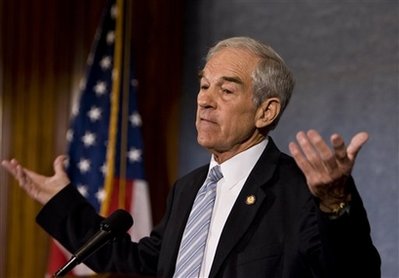Ron Paul Polls


All the Presidential candidates want as a portion of their delegates these state legislative leaders because of their whip experience. These delegates actually work – although it is pleasant – at the conventions. 10 percent of the delegates to the national convention are party Pooh Bahs, 10 elected officials, a good percentage major donors. Ron Paul polls consistently higher than any other independent or third party presidential nominee. Now, if only he wasn't running as a Libertarian.
Typically though, the majority of delegates are rookies. It is therefore important that there be a competent Whip Operation to chaperone them. Often times, in the lead up to the Convention the Whips will meet beforehand with small groups of delegates at a time in a social setting with someone from the campaign in tow to explain what the delegates should expect or should expect from them.
In the case of Group I states where the delegates are Santorum or Gingrich delegates they are free agents. In the Group 2 states, there is no way that the Paul Delegates will listen to the Romney Whip operation – if it even exists in that state.
The other issue that was raised via State Law or State Party Rules to sanction delegates and here Governor Romney has to be very very careful because this will blow up on him because it raises the issue of the “Speech and Debate Clause” of the United States Constitution at political conventions.
The United States Constitution as adopted in 1787 did not mention or sanction political parties. The 1st Amendment while it recognized a right of free speech and peaceable assembly to petition the government for redress of grievances, the real constitutional basis for political parties is the 12th Amendment adopted in 1804. The 12th Amendment was in response to the intrigues associated with the Elections of 1796 and 1800.
Delegates to national conventions are participating in a federal electoral process. Prior to the United States Supreme Court’s decision in United States v. Classic in 1941 it was unclear if the United States Constitution empowered Congress to regulate primary elections and political party nominations procedures. Classic held that it did but only in cases where state law made primaries and nominations part of the election and/or whenever the primary effectively determined the outcome of the election. A corollary effect of Classic was that Congress by regulating procedures was as such bound by the provisions of the Constitution vis-à-vis the Bill of Rights and other constitutional protections.
Subsequently in 1944 in Smith v. Allwright, the United States Supreme Court relied on Classic and held that what political parties by using state law to enforce their decisions that is State Action and also brings into play the various provisions of the Constitution affecting voting rights. The Supreme Court held that given the role primaries play in the election process, the right to vote in such a primary for the nomination of candidates without discrimination by the State, like the right to vote in a general election, is a right secured by the Constitution. The Court further held that by the terms of the Fifteenth Amendment, that right may not be abridged by any state on account of race. The Court specifically noted:
“We are thus brought to an examination of the qualifications for Democratic primary electors in Texas, to determine whether state action or private action has excluded Negroes from participation. Despite Texas' decision that the exclusion is produced by private or party action, Federal courts must for themselves appraise the facts leading to that conclusion. It is only by the performance of this obligation that a final and uniform interpretation can be given to the Constitution, the "supreme Law of the Land.



